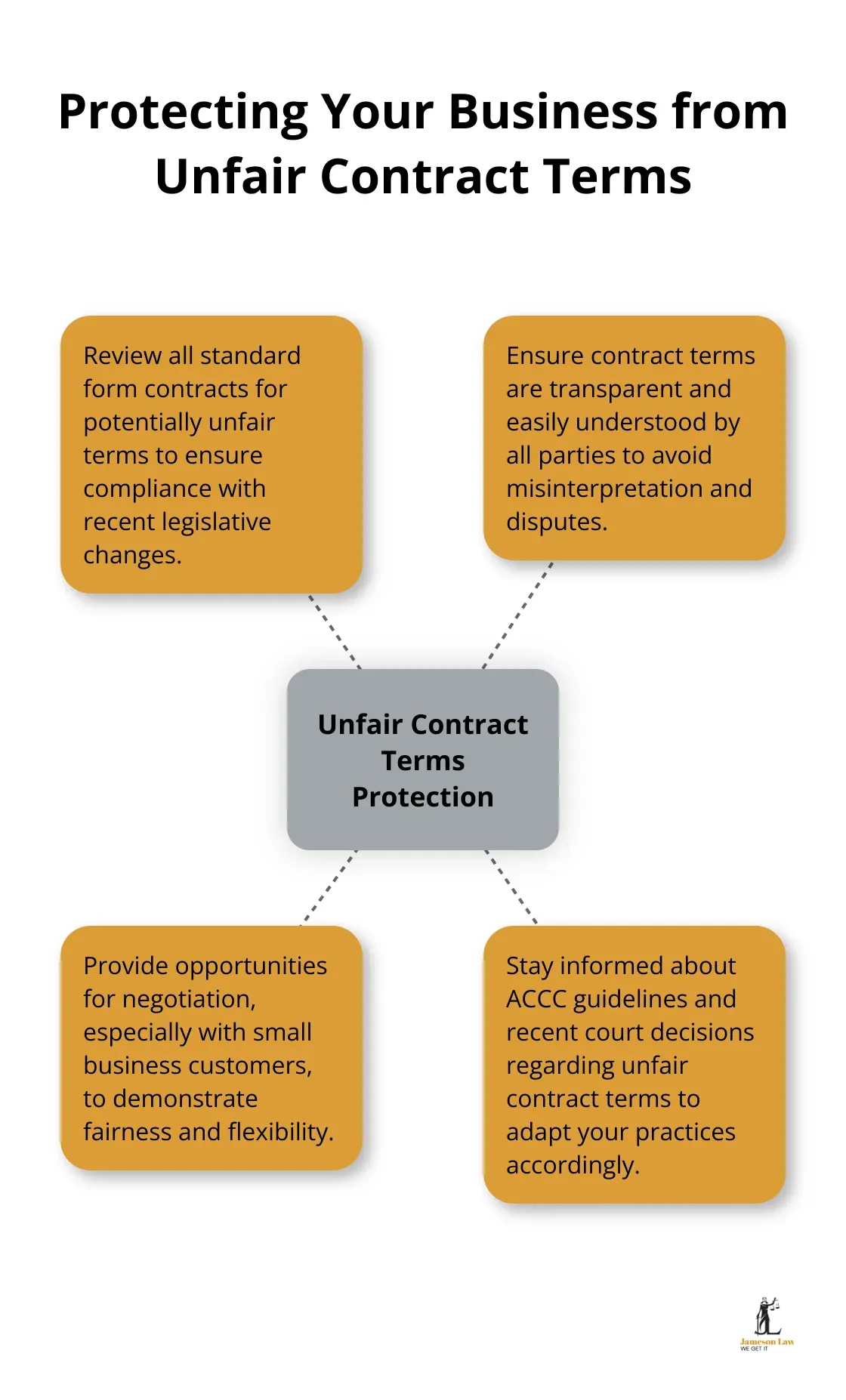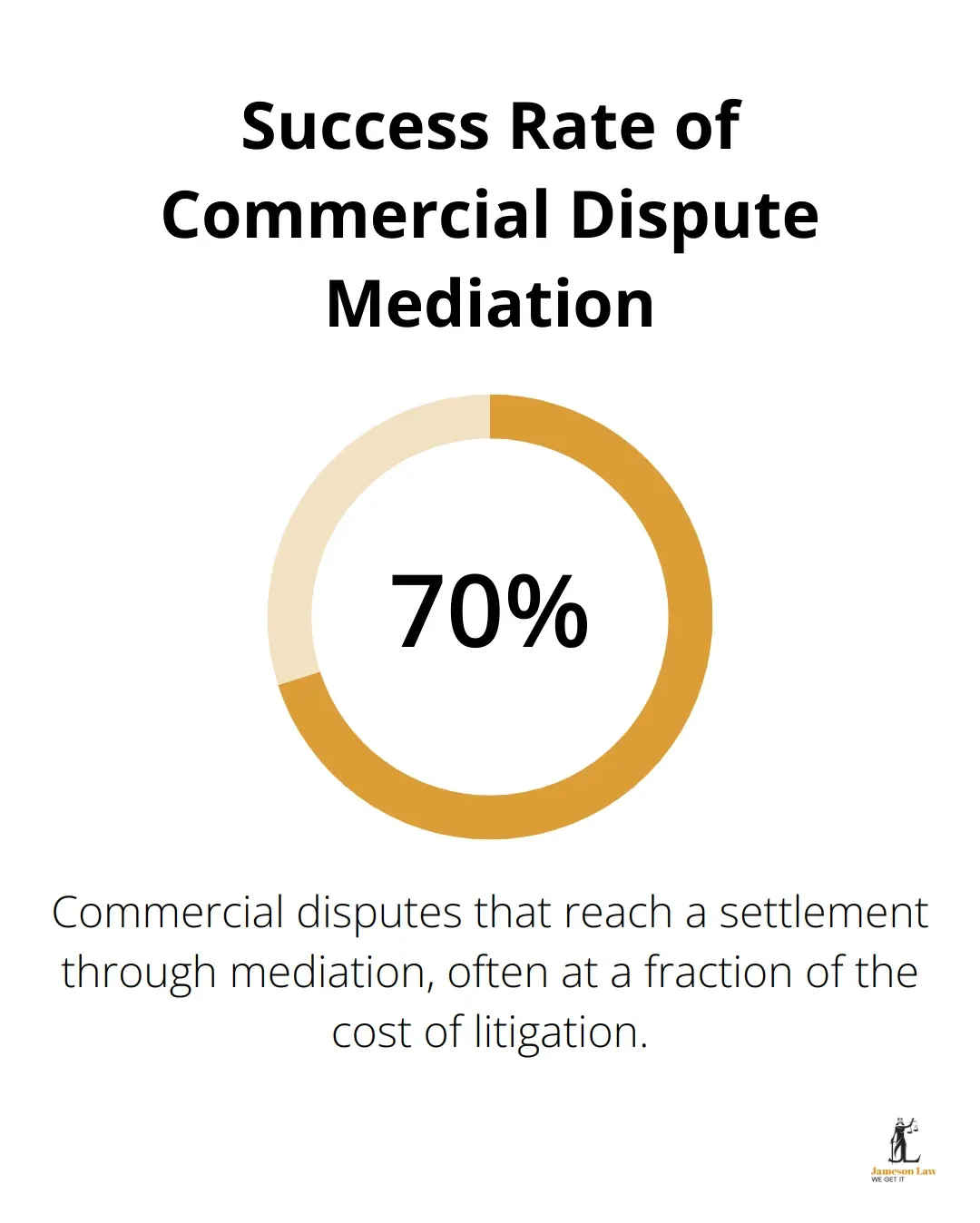Australian commercial law forms the backbone of business operations in our country. It’s a complex field that covers everything from contracts to consumer protection.
At Jameson Law, we’ve created this concise guide to Australian commercial law to help you navigate its key aspects. We’ll explore common legal issues businesses face and provide practical tips for addressing them.
Key Aspects of Australian Commercial Law
Contract Law: The Foundation of Business Transactions
Contract law forms the bedrock of commercial interactions in Australia. It establishes the rules for creating, interpreting, and enforcing agreements between parties. In 2023, a total of 31,497 patent applications were filed, which is 2.4% below 2022 and 2.8% below the record high of 2021, highlighting the importance of well-drafted contracts in protecting intellectual property.

To avoid costly litigation, businesses should create clear, comprehensive, and fair contracts. Key elements to include are:
![]() Specific performance obligations
Specific performance obligations
![]() Payment terms
Payment terms
![]() Dispute resolution clauses
Dispute resolution clauses
![]() Termination conditions
Termination conditions
Operating in Sydney or across NSW? Local regulators like ASIC and the ACCC take contract compliance seriously. If you’re unsure about a clause, our Sydney team can review it before you sign — call us on (02) 8806 0866.
Consumer Protection: Safeguarding Fair Trade
The Australian Consumer Law (ACL) sets out the rules for fair trading and consumer protection. One of the most significant recent developments in this area has been changes to the law regarding unfair contract terms.
Businesses must comply with ACL provisions, including:
![]() Avoiding misleading or deceptive conduct
Avoiding misleading or deceptive conduct
![]() Providing consumer guarantees
Providing consumer guarantees
![]() Adhering to product safety standards
Adhering to product safety standards
![]() Complying with unfair contract terms legislation
Complying with unfair contract terms legislation
Recent changes to unfair contract terms law have significantly increased penalties. As of November 2023, companies can face fines of up to $50 million for including unfair terms in standard form contracts. For official guidance, see the ACCC.
Intellectual Property: Protecting Innovation and Creativity
Intellectual property (IP) rights are essential for businesses looking to protect their innovations and creative assets. IP Australia reported over 29,000 patent applications in 2022, indicating a growing awareness of IP protection.
Australian businesses should consider:
![]() Registering trade marks to protect brand identity
Registering trade marks to protect brand identity
![]() Applying for patents to safeguard inventions
Applying for patents to safeguard inventions
![]() Securing copyright for original works
Securing copyright for original works
![]() Protecting trade secrets through confidentiality agreements
Protecting trade secrets through confidentiality agreements
Under the Intellectual Property Laws Amendment Act, those who have already obtained or applied for innovation patents will continue to be able to enforce them. It will also be possible to file divisional innovation patent applications from existing innovation patent applications.
Understanding these key aspects of Australian commercial law is essential for business success. Regular legal audits and expert advice can help companies navigate this complex landscape and avoid costly pitfalls. (At Jameson Law, we provide tailored guidance to ensure our clients’ commercial activities align with current legal requirements and best practices.)
As businesses grapple with these fundamental aspects of commercial law, they often encounter specific legal challenges. Let’s explore some of the most common legal issues that Australian businesses face and how to address them effectively.
Common Legal Pitfalls for Australian Businesses
Australian businesses face numerous legal challenges that can significantly impact their operations and financial health. This chapter explores the most prevalent issues and provides practical strategies to address them effectively.
Breach of Contract: A Persistent Problem
Contract breaches remain one of the most frequent legal issues for Australian businesses. As of 1 July 2020, Probate applications in Victoria must be submitted online through the Probate Online system. These breaches often result from misunderstandings about contract terms or failure to meet obligations.
To reduce this risk, businesses should:
![]() Implement clear communication protocols with all parties involved in a contract
Implement clear communication protocols with all parties involved in a contract
![]() Review and update contract terms regularly to reflect changing business relationships
Review and update contract terms regularly to reflect changing business relationships
![]() Maintain detailed records of all contract-related communications and actions
Maintain detailed records of all contract-related communications and actions
(Proper documentation can serve as crucial evidence in case of disputes.)
Unfair Contract Terms: A Growing Concern
The Australian Competition and Consumer Commission (ACCC) has intensified its focus on unfair contract terms, particularly in standard form contracts. As of November 11, 2022, consumer lobby groups such as Choice have long advocated for unfair contract terms to be made illegal and subject to civil penalties.

Businesses can protect themselves by:
![]() Reviewing all standard form contracts for potentially unfair terms
Reviewing all standard form contracts for potentially unfair terms
![]() Ensuring terms are transparent and easily understood by all parties
Ensuring terms are transparent and easily understood by all parties
![]() Providing opportunities for negotiation, especially with small business customers
Providing opportunities for negotiation, especially with small business customers
Misleading and Deceptive Conduct: A Costly Mistake
Misleading and deceptive conduct claims continue to plague Australian businesses. For official guidance and enforcement examples, see ASIC.
To avoid such claims, businesses should:
![]() Implement rigorous review processes for all marketing materials and public statements
Implement rigorous review processes for all marketing materials and public statements
![]() Provide regular training to staff on Australian Consumer Law requirements
Provide regular training to staff on Australian Consumer Law requirements
![]() Maintain accurate and up-to-date records of all product claims and specifications
Maintain accurate and up-to-date records of all product claims and specifications
Intellectual Property Infringement: Protecting Innovation
Intellectual property (IP) infringement cases have risen in recent years. (This trend highlights the importance of robust IP protection strategies.)
To safeguard their intellectual property, businesses should:
![]() Conduct thorough IP searches before launching new products or services
Conduct thorough IP searches before launching new products or services
![]() Register trade marks, patents, and designs promptly
Register trade marks, patents, and designs promptly
![]() Monitor the market for potential infringements and take swift action when necessary
Monitor the market for potential infringements and take swift action when necessary
Data Privacy and Cybersecurity: Emerging Threats
With the increasing digitisation of business operations, data privacy and cyber security have become critical concerns.
To mitigate these risks, businesses should:
![]() Implement robust data protection policies and procedures
Implement robust data protection policies and procedures
![]() Conduct regular cyber security audits and employee training
Conduct regular cyber security audits and employee training
![]() Develop and test incident response plans for potential data breaches
Develop and test incident response plans for potential data breaches
These common legal pitfalls underscore the complex legal landscape Australian businesses must navigate. The next chapter will explore effective strategies for addressing these challenges and minimising legal risks in commercial operations.
How to Protect Your Business from Legal Risks
The Power of Proper Documentation
Meticulous record-keeping serves as your first line of defence against legal challenges. A recent case in the NSW Supreme Court saw a company avoid a $500,000 breach of contract claim due to their detailed records of all communications and transactions.
To enhance your documentation practices:
![]() Implement a centralised digital system for storing all business records, contracts, and communications.
Implement a centralised digital system for storing all business records, contracts, and communications.
![]() Train employees on proper documentation procedures. Emphasise the importance of recording even seemingly minor interactions.
Train employees on proper documentation procedures. Emphasise the importance of recording even seemingly minor interactions.
![]() Conduct regular audits of your record-keeping processes to ensure compliance with Australian record retention laws.
Conduct regular audits of your record-keeping processes to ensure compliance with Australian record retention laws.
The Value of Early Legal Consultation
Seeking legal advice at the first sign of a potential issue can save your business significant time and money. The Law Society of NSW reports that businesses which consult lawyers early in a dispute spend on average 30% less on legal fees compared to those who delay seeking advice.
To maximise the benefits of early legal consultation:
![]() Establish a relationship with a trusted legal adviser who understands your business.
Establish a relationship with a trusted legal adviser who understands your business.
![]() Create internal guidelines for when to seek legal advice (such as before signing major contracts or when facing potential regulatory issues).
Create internal guidelines for when to seek legal advice (such as before signing major contracts or when facing potential regulatory issues).
![]() Consider retaining a law firm on a consultancy basis for ongoing legal support and quick access to advice when needed.
Consider retaining a law firm on a consultancy basis for ongoing legal support and quick access to advice when needed.
Embracing Alternative Dispute Resolution
Alternative Dispute Resolution (ADR) methods like mediation and arbitration have gained popularity in Australian commercial disputes. The Australian Disputes Centre reports that 70% of commercial disputes resolved through mediation reach a settlement, often at a fraction of the cost of litigation.

To effectively utilise ADR:
![]() Include ADR clauses in your contracts. Specify preferred methods and procedures.
Include ADR clauses in your contracts. Specify preferred methods and procedures.
![]() Familiarise yourself with various ADR options and their benefits for different types of disputes.
Familiarise yourself with various ADR options and their benefits for different types of disputes.
![]() Consider engaging a professional mediator or arbitrator with expertise in your industry for complex disputes.
Consider engaging a professional mediator or arbitrator with expertise in your industry for complex disputes.
Staying Informed on Legal Changes
Australian commercial law evolves rapidly. Businesses must stay informed about legislative changes that may affect their operations.
To keep up with legal developments:
![]() Subscribe to legal newsletters and updates from reputable sources.
Subscribe to legal newsletters and updates from reputable sources.
![]() Attend industry seminars and workshops focused on legal compliance.
Attend industry seminars and workshops focused on legal compliance.
![]() Conduct regular legal audits of your business practices to identify areas that may need updating. As regulations shift rapidly, regular audits and compliance software help businesses stay ahead and maintain trust with stakeholders.
Conduct regular legal audits of your business practices to identify areas that may need updating. As regulations shift rapidly, regular audits and compliance software help businesses stay ahead and maintain trust with stakeholders.
Implementing Robust Compliance Programs
A strong compliance program can prevent many legal issues before they arise. This proactive approach often proves more cost-effective than reactive legal strategies.
To develop an effective compliance program:
![]() Identify key areas of legal risk specific to your industry and business model.
Identify key areas of legal risk specific to your industry and business model.
![]() Create clear policies and procedures that address these risks.
Create clear policies and procedures that address these risks.
![]() Provide regular training to employees on compliance requirements and best practices.
Provide regular training to employees on compliance requirements and best practices.
Final Thoughts
Australian commercial law shapes the foundation of business operations in our country. It encompasses contract law, consumer protection, and intellectual property rights, which businesses must navigate to succeed. Companies face challenges such as contract breaches, unfair terms, and misleading conduct, but can address these issues with proper strategies.
Legal compliance plays a vital role in business success. Proper documentation, early legal consultation, and alternative dispute resolution methods help companies navigate the commercial landscape effectively. Businesses that stay informed about legal changes and implement robust compliance programs position themselves for long-term success.
We at Jameson Law offer tailored legal support across various areas of commercial law. Our team of experienced professionals provides guidance to help businesses make informed decisions and protect their interests. Proactive legal management proves more cost-effective than reactive problem-solving, so partnering with a trusted legal adviser can make a significant difference in achieving business goals while maintaining legal compliance.
Sydney & NSW clients: need commercial law help now? Call (02) 8806 0866 or contact Jameson Law for a confidential chat with our litigators and commercial lawyers.













